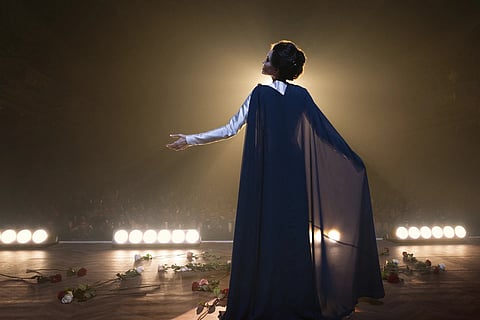
- LIFESTYLE
- FASHION
- FOOD
- ENTERTAINMENT
- EVENTS
- CULTURE
- VIDEOS
- WEB STORIES
- GALLERIES
- GADGETS
- CAR & BIKE
- SOCIETY
- TRAVEL
- NORTH EAST
- INDULGE CONNECT

Angelina Jolie’s transformation into opera legend Maria Callas for Pablo Larraín’s Maria marked more than a return to acting. It was a deeply personal journey into vulnerability, strength and emotional excavation.
“All of us don’t realise where things land in our body over a lifetime,” Jolie said in a recent interview. “We hold things in our stomachs, our chest. We breathe differently when we’re nervous or sad. The first few weeks of preparation for this role were the hardest because my body had to open, and I had to breathe again.”
Jolie portrays Callas in the film’s depiction of the soprano’s final days, set largely in her Paris apartment. Having lost her voice, Callas confronts the myth of her public persona while redefining her identity. It’s an intimate portrait rather than a traditional biopic, in line with Larraín’s previous works, Jackie and Spencer. In Maria, Jolie captures the fragility and grandeur of Callas, delivering a performance hailed as one of her most compelling in years.
A return to the screen
Over the past decade, Jolie has taken a step back from acting to focus on directing and raising her six children. Her choices were guided by practicality. “For quite a few years, I worked very little. My choices were financially smart and short,” she admitted. But her youngest children are now 16, and Jolie is stepping back into the spotlight with a role that aligns with her evolution as an artist.
When Larraín first approached her, he screened Spencer to convey his vision. “I felt she could have that magnetism,” Larraín said. “Maria Callas carried the weight of her experiences, her music and her fame. Angelina carries a similar weight, embodying a life that’s been intense.”
Blurring boundaries
To portray Callas authentically, Jolie underwent voice training, though the film incorporates archival recordings of the soprano. “Early in the process, I discovered you can’t fake-sing opera,” Jolie said. Despite never singing before—not even karaoke—the role brought her closer to the art form. “Opera meets the enormity of pain and loss. It’s something I’ve grown to appreciate as I get older,” she reflected.
Jolie’s children, Maddox and Pax, worked on the film’s set, witnessing a new side of their mother. “They’ve seen me sad before, but I don’t cry like that in front of them,” she shared. Callas’ story allowed Jolie to confront her own emotions, a process that resonated deeply with her family.
Parallels of loneliness
Jolie found a kinship with Callas in their shared sense of isolation. “There’s a loneliness that we both share. It’s not necessarily a bad thing; it’s just part of who we are,” she said. Like Callas, Jolie’s public image has often overshadowed her personal identity. “I’ve never been fully comfortable with a public life. I’m a public person because I love my work, not the attention.”
Larraín, known for exploring enigmatic figures, felt that Jolie’s own mystique mirrored Callas’. “People might think they know Angelina, but she carries an enormous amount of mystery. The same goes for Maria,” he said.
A lasting impression
For Jolie, playing Callas was a transformative experience that continues to linger. “When you play a real person, they become your friend,” she said. “Hearing her music now brings back a flood of emotions.”
Whether Maria heralds more acting roles for Jolie remains uncertain, but the film has undoubtedly deepened her connection to her craft. In her portrayal of Callas, Jolie reveals not just the diva’s complexities but also her own capacity for growth and self-discovery.
Maria premiered in cinemas on 27 November and will begin streaming on Netflix from 11 December.